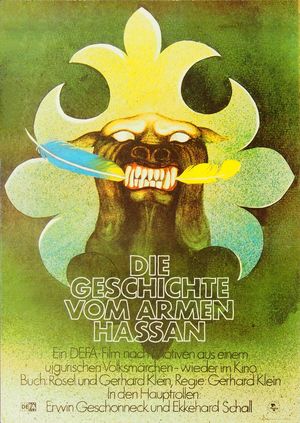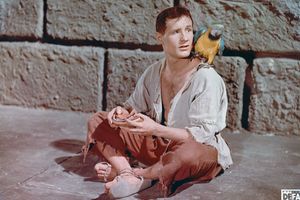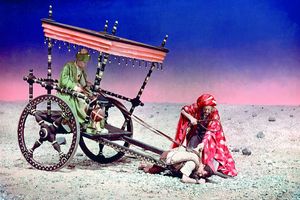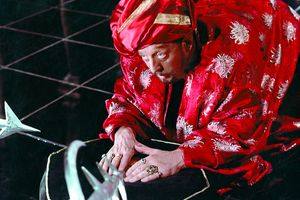Die Geschichte vom armen Hassan
Director: Gerhard Klein, 59 Min., Color, Feature Film
Deutsche Demokratische Republik (DDR)
DEFA-Studio für Spielfilme, 1958
- Film/Video Format
- 35 mm
- Length in m
- 1635
- Other Title
- Hassan und der reiche Kaufmann Machmud
- English Title
- The Story Of Poor Hassan
- Premiere Date
- Release Date (for Cinema)
- Literary Source
- Der arme Hassan und Bay Machmud (Ujgurisches Märchen)

(Dir.: Gerhard Klein, 1958)
Short Summary (English)
Hassan, a poor and lonesome human pack mule, ekes out a living in the stony desert. While he is literally dying of thirst, the fountains in .the wealthy merchant Machmud's garden are brimming over. One day, Hassan's parrot perches on the edge of a fountain soon to be attacked by Machmud's watchdog. To rescue his erstwhile friend, Hassan is compelled to kill the dog. He is taken to court and sentenced by the qadi to be chained and to take on the watchdog's duties. And when he fails to prevent a horse being stolen, he has to carry out this animal's work as well. His only ray of hope is Fatima, a slave. But not even she can persuade him to escape. He believes his place on earth is predestined by Allah. Not until he happens to overhear the merchant and the qadi making deals, does he finally realize that the rich dictate the order of the world. The two villains go out riding, with Hassan taking on the part of one of the horses. He suddenly slips off his shackles and, with all his might, flings the carriage - and its passengers - against a rock. He goes back to open the merchant's garden to all who are thirsty. (Source: Progress Film-Verleih)

(Dir.: Gerhard Klein, 1958) Photography: Eberhard Daßdorf

(Dir.: Gerhard Klein, 1958) Photography: Eberhard Daßdorf
Film Crew
- Director
-
- Gerhard Klein
- Script
-
- Rosel Klein
- Camera
-
- Götz Neumann
- Film Editing
-
- Evelyn Carow
- Cast
-
- Ekkehard Schall (Hassan)
- Erwin Geschonneck (Kaufmann Machmud)
- Ernst Otto Fuhrmann (Kadi)
- Georgetta Sager (Fatima)
- Heinz Schubert (Wasserhändler)
- Assistant Director
-
- Otto Roland
- Assistant Camera
-
- Peter Süring
- Production Design
-
- Hans Poppe
- Script Editing
-
- Margot Beichler
- Music
-
- Hans-Dieter Hosalla
- Sound
-
- Gerhard Hoffmann
- Costume Design
-
- Marianne Schmidt
- Make-Up
-
- Gerhard Zeising
- Props
-
- Rudolf Borchardt
- Production Management
-
- Erich Albrecht
- Unit Production Management
-
- Otto Ziesenitz
- DEFA Photography
-
- Eberhard (auch: Franz-Eberhard) Daßdorf
Short Summary (German)
Steinig und wasserarm ist das Land in der mittelasiatischen Heimat des armen Hassan. Mit verlangendem Blick schaut er täglich auf den randvollen Brunnen im Garten des reichen Kaufmanns Machmud. Eines Tages fällt ihn dessen Wachhund an, und er muss ihn erschlagen, um sein Leben zu retten. Der Kadi verurteilt Hassan, die Stelle des Wachhundes einzunehmen. Als ein Pferd gestohlen wird, muss er auch noch dessen Arbeit verrichten. Ein belauschter Handel zwischen dem Kaufmann und dem Kadi macht Hassan klar, dass die Weltordnung nicht von Allah bestimmt wird, sondern von den Reichen. Während einer Spazierfahrt der beiden in die Wüste, bei der er die Rolle des Pferdes innehat, streift er seine Fesseln ab. Mit enormer Kraft schleudert er den Wagen samt Insassen gegen einen Felsen, kehrt zurück und öffnet den Garten des Kaufmanns für alle Dürstenden.
(Quelle: Das zweite Leben der Filmstadt Babelsberg. DEFA-Spielfilme 1946-1992)
Short Summary (Other Languages)
Il povero Hassan, nativo di una zona sassosa e povera d'acqua dell'Asia centrale, guarda con bramosia il pozzo ricolmo nel giradino del ricco commerciante Machmud. Per difendersi dal suo cane da guardia, Hassan è costretto a ucciderlo. Il Qadi lo condanna a fare lui da cane da guardia. Dopo il furto di un cavallo, Hassan è costretto a svolgere anche il lavoro di questo animale. Venuto a sapere dei loschi affari fra il commerciante e il Qadi, Hassan capisce che il mondo non è governato da Allah, ma dai ricchi. Trainando i due in gita nel deserto, Hassan si ribella e, sfilandosi le redini, scaraventa carro e ospiti contro una roccia. Poi corre a casa e apre il giardino del commerciante agli assetati. (Italienisch)



